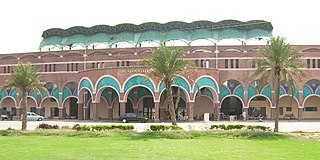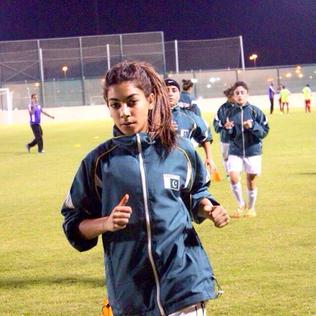Related Research Articles

The Punjab Stadium is a multi-purpose stadium in Lahore, Pakistan. It is currently used mostly for football matches and serves as one of the home venues for the Pakistan national football team. The stadium has a capacity of around 10,000 spectators. It is owned and operated by the Punjab Sports Board.

Jinnah Sports Stadium is a multi-purpose stadium in Islamabad, Pakistan. It is currently used mostly for football matches and serves as the home venue for the Pakistan national football team. The stadium has a capacity of 48,700 people, and is the largest stadium in Pakistan. The stadium is owned by the Pakistan Sports Board. The stadium is part of the Pakistan Sports Complex which also houses a gymnasium sports complex for indoor sports.
Sport in Pakistan is a significant part of Pakistani culture. Cricket is the most popular sport in Pakistan. Football has also gained popularity in recent years, and is the second most popular sport in the country. Field hockey is the national sport, and was popular for several decades, with some of Pakistan's greatest sporting accomplishments having taken place in this sport, along with squash. Polo and traditional sports like kabaddi and other well-known games are also played.
Ayub National Stadium, formerly known as the Baluchistan Cricket Association Ground, is a multi-purpose stadium in Quetta, Pakistan. It is currently used mostly for hosting football matches. The stadium has a capacity of 20,000 people. The ground is part of the Ayub Sports Complex, which contains the football pitch, tartan track, two halls for indoor games, handball court and two hockey turfs. It is located next to the Bugti Stadium used for cricket.

The Pakistan Rugby Union (PRU) is the rugby union governing body in Pakistan. It is in charge of the Pakistan national team. Also among the Union's chief activities are conferences, organising international matches, and educating and training players and officials.

The Athletics Federation of Pakistan (AFP) is the apex body of athletics in Pakistan. It was formed in 1951. Major General (R) Muhammad Akram Sahi is the current President.

The Pakistan Cycling Federation is the national governing body of cycle racing in Pakistan. It was established in 1947 and is currently based in Lahore.

Muslim Football Club is a Pakistani professional football club based in Chaman, Balochistan that competes in the Pakistan Premier League. The players during the club's initial years were semi-professional, most having another source of income besides playing football.
Joyann Geraldine Thomas is a football player from Pakistan. She plays as a defender for the national team as well as for her club, Balochistan United. She is the first female Christian to play football for Pakistan.

Princess Shahlyla Ahmadzai Baloch was a Pakistani professional footballer who played as a forward for Balochistan United and the Pakistan national women's team. She was granddaughter of Prince Agha Abdul Karim Khan Ahmedzai, who was the younger brother of the Khan of Kalat, Mir Ahmedyar Khan.

The 2016 Pakistan Cup was a five-team limited overs (one-day) cricket tournament that took place in Faisalabad, Punjab, from 19 April to 1 May 2016. It was contested by teams representing Pakistan's four provinces and the capital. Squads for the tournament were selected based on a draft system.

Syeda Mahpara Shahid Bukhari, known as Syeda Mahpara or Mahpara Shahid, is a Pakistani footballer. She is the goalkeeper of the Pakistan women's national football team, and represents WAPDA at club level.
Sahar Zaman (born 6 December 1996) is a Pakistani footballer who plays as a midfielder. She is a member of the Pakistan women's national football team.

Jalila Haider is a Pakistani human rights attorney and political activist from Quetta in Balochistan, Pakistan. She is known to be the first woman lawyer from Quetta's Hazara minority, and an advocate for the rights of her persecuted community. She is a member of the Awami Workers Party (AWP), leader of the Balochistan chapter of Women Democratic Front (WDF), and also an activist in the Pashtun Tahafuz Movement (PTM). She founded a non-profit organisation, "We the Humans – Pakistan," which aims to empower local communities in Balochistan by strengthening opportunities for vulnerable women and children.

Moiz Ullah Baig is a Pakistani Scrabble player who won the World Youth Scrabble Championship 2013 and the World Junior Scrabble Championship 2018, becoming the first player ever to win both. He won the Pakistan Scrabble Championship in 2018 and is currently the number 1 player of the country. In December 2018, with a WESPA rating of 1921, he climbed up to the 71st place in the world rankings – his career highest.
Shahida Abbasi is a Pakistani karateka. She is the first Pakistani woman to compete internationally in kata.
Moqaddas Ashraf is a Pakistani professional squash player. As of November 2020, she is ranked number 133 in the world.
Sana Mahmud is a former footballer and basketball player from Pakistan. She was captain of the women's national team for both sports.
Alamgir Ali Khan Ghazi is a Pakistani professional footballer who plays as a midfielder for WAPDA and the Pakistan national team.
Haji Abdul Sattar is a Pakistani former footballer who played as a defender for Pakistan Army F.C. as well as the Pakistan national team. Sattar was the author of the lone goal in the final against Bangladesh at the 1989 South Asian Games, which saw Pakistan win their first title at the tournament.
References
- ↑ National Team Archived 11 November 2016 at the Wayback Machine PFF Official website. Retrieved 20 May 2016
- ↑ "Abiha Haider: Football & AFL in Pakistan and social activism". Sportageous. 21 April 2020. Archived from the original on 29 January 2022. Retrieved 29 January 2022.
- ↑ "Abiha Haider makes to 30 most powerful Muslim women in sports". www.paktribune.com. Retrieved 29 January 2022.
- ↑ "Kamyab Jawan". kamyabjawan.gov.pk. Retrieved 29 January 2022.
- ↑ "Sports Sciences enter last eight in NWFC". DAWN.COM. 1 August 2010. Retrieved 29 January 2022.
- ↑ "TEDxNUST | TED". www.ted.com. Retrieved 29 January 2022.
- ↑ "Abiha Haider says record prize money 'highly encouraging' for women footballers". www.geosuper.tv. Retrieved 29 January 2022.
- ↑ "Army begin National Women Football title defence in style". www.thenews.com.pk. Retrieved 29 January 2022.
- ↑ Report, Recorder (21 March 2021). "Hashoo Group hosts dinner for women football team". Brecorder. Retrieved 29 January 2022.
- 1 2 "Pakistan's Haider making her dreams come true". www.fifa.com. Retrieved 29 January 2022.
- ↑ "Pakistan female footballers play world record 69-hour match". Samaa TV . 3 July 2019. Retrieved 30 January 2022.
- ↑ Khilari. "Meet remarkable youthful footballer, Abiha Haider! - Khilari". www.khilari.com.pk. Retrieved 29 January 2022.
- 1 2 "Most nationalities in a football (soccer) exhibition match". Guinness World Records. Retrieved 29 January 2022.
- ↑ "Pak women play soccer match in Lyon". The News International. 4 July 2019. Retrieved 29 January 2022.
- ↑ "Abiha wins for Pakistan". Associated Press of Pakistan . 22 July 2020. Retrieved 30 January 2022.
- ↑ "The Little Art Live Talks – Extraordinary 25 Under 25 Women – The Little Art" . Retrieved 29 January 2022.